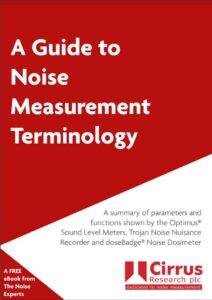What’s the difference between a sound level meter and a noise dosimeter?
I’m relatively new to the world of acoustic measuring and noise measuring equipment, and one of the very first questions I found myself asking was “what’s the difference between a sound level meter and a noise dosimeter?” Thankfully, the distinction is relatively simple and a complete novice like me can get to grips with it. So if you’re looking to purchase some noise measuring equipment but haven’t got a clue whether or not you need to be a sound level meter or a dosimeter, then let me be your guide and explain the differences between the two.
If you’re completely new to the world of noise measuring, check out our FREE guide to noise terminology, which will help you understand some of the key terms you’ll come across.
Sound level meters and what they’re used for
The good news is that both sound level meters and noise dosimeters measure noise levels; so if that’s what you’re looking for, you’re in the right place. Sound level meters are typically bigger in size and are used to measure noise exposure in the workplace or in the environment. The readings that they can provide can show how loud a particular area of a factory is or can record the noise next to an airport; there’s really no limit to the sorts of noise they can measure or where they can measure it…apart from in space…because there’s no sound in space. So if you need to measure how loud your newest piece of factory machinery is or the noise levels in your car servicing bay, a sound level meter is the piece of kit for you.
Now here’s where it gets a bit technical. There are two types of sound level meter: Class 1 and, you guessed it, Class 2. Put simply, Class 1 instruments are far more accurate than Class 2 as they have a smaller margin for error in their measurements. That being said, the UK Noise At Work regulations allow for Class 2 measurements to be used; the use of Class 1 instruments is usually reserved for environmental noise and noise nuisance measuring, to ensure that should any measurements be challenged, the most accurate data possible is available. There’s obviously a lot of science behind the tolerance levels and margins for error in Class 1 and Class 2 instruments, which is explored in our article here.
So what about noise dosimeters?
Put simply, a noise dosimeter is a specialised type of sound level meter that is used to measure personal noise exposure levels. They can also be used when it isn’t safe or practical to use a full-sized sound level meter, such as in areas with a high fire risk or in confined spaces. So if you’re looking to measure the noise exposure of a pneumatic drill operator on your building site, or need data to show the noise levels on an oil ring or in a mine, a noise dosimeter is what you should be aiming for. The other great thing about noise dosimeters is that they can be used to record someone’s exposure for a full working day, in multiple areas of your workplace and with modern technology and innovative designs, most noise dosimeters are light and unobtrusive, meaning that people can wear them and carry on with their work unhindered.
So that’s it! A quick overview of the difference between a sound level meter and a noise dosimeter, that’s hopefully easy to understand. Of course if you’d like more information, the best thing to do would be to get in touch with a member of our team who’ll be able to help you should you still be unsure as to which piece of equipment you need.
Noise measuring equipment offered by Cirrus Research
Cirrus is a market leader in noise measuring equipment and pioneered modern noise dosimeters with the invention of the doseBadge in 1995. As such, there are a number of products that Cirrus offers to meet your noise measuring needs. No matter whether you’re a health and safety officer or a local authority official, we have a range of sound level meters and noise dosimeters to provide you with accurate data, which will enable you to play your part in protecting people noise-induced hearing loss and other noise-related health conditions.
For sound level meters we offer the Optimus range, which can be used for a number of different applications and come are available in as either a Class 1 or Class 2 device. The innovative and game-changing doseBadge range of noise dosimeters, including the newest version the doseBadge5, are also available in various different specifications, each to suit your individual needs. We are also proud to be able to offer an Intrinsically Safe version of the doseBadge, which is safe for use in volatile areas such as on oil rigs and in mines.
Jaymee-lee Tolliday
Latest posts by Jaymee-lee Tolliday (see all)
- Turning Down the Volume: How the Trojan Noise Nuisance Recorder can help create a quieter world - 13th February 2024
- Festive Opening Hours 2023 - 6th December 2023
- Award of Excellence for Cloud-Based Monitoring Solutions 2023! - 20th November 2023

